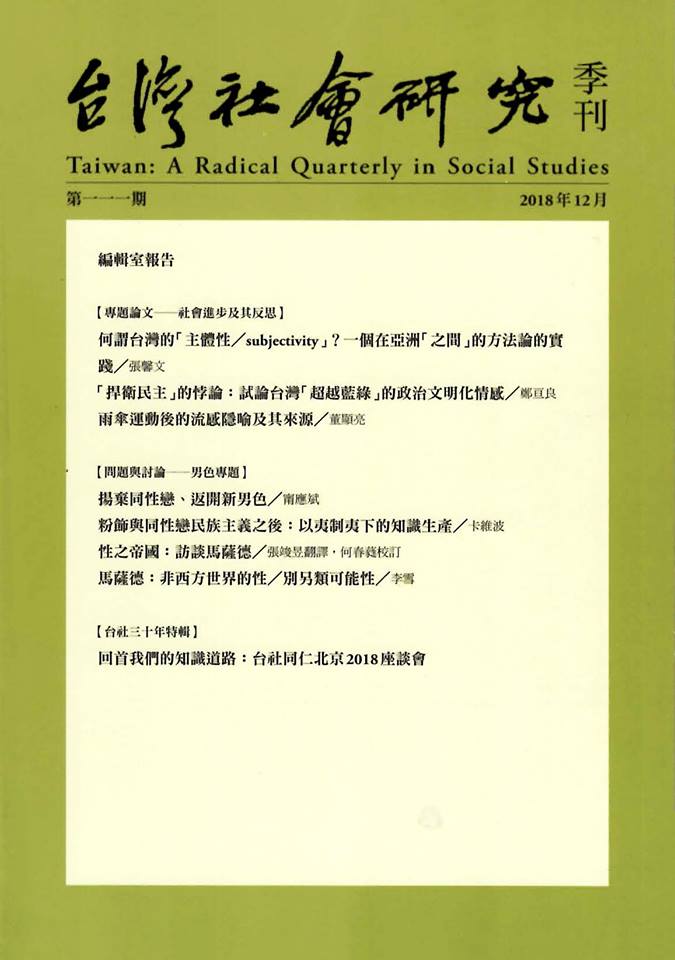
《台灣社會研究季刊》 第111期:
編輯室報告(111 民107.12 頁1-3)
【專題論文──社會進步及其反思】
何謂台灣的「主體性/subjectivity」?一個在亞洲「之間」的方法論的
實踐/張馨文(111 民107.12 頁7-57)
「主體性」是台灣當代政治實踐的關鍵詞,這個概念在1990年代跨越學科領域且在民間流行起來,堪稱重要的社會與政治現象。雖然是從subjectivity翻譯而來,subjectivity在西方是關於構成性的哲學問題的概念,本身並沒有如同「主體性」一詞在台灣那樣被人們當成所欲求的政治價值。本文的目的有二,一是提出探討「何謂主體性?」的研究方法。本文的「方法論」是印度後殖民女性主義學者寧蒂珠(Tejaswini Niranjana)所提出的「在亞洲『之間』的方法論」(Inter-Asia Methodology)。依照此方法論中「對概念『使勁』」(“pressing” the concept)的原則,發展適用於台灣的後殖民研究方法──將「譯者之言」視為「他者」,並且將翻譯的意義落差視為概念政治化之所在──我稱之為「控白概念」研究法。第二,運用「控白概念」研究方法,分析1990年代的主體性現象。我以1992年至1996年間《中外文學》一系列關於台灣與主體性的辯論為分析的對象,示範「主體性/subjectivity」如何在這個具權威性的學術場域中的運作。本文以翻譯的政治與菁英的交鋒作為切入點來回答「何謂主體性?」的問題,將主體性的概念視為菁英譯者階級的發明,意義混淆不明並非「民間」「誤用」的結果,而是與譯者的慾望有關。
關鍵詞:主體性、後殖民理論、翻譯、亞洲作為方法、在亞洲「之間」的方法論、文化霸權
Zhu-ti-xing is a fundamental political concept in contemporary Taiwan. The concept has become popular since the 1990s, to the extent that it can be seen as a significant social and political phenomenon. Zhu-ti-xing is the Chinese translation of the concept of subjectivity. However, as a philosophical concept for questioning the constitution of the subject, the concept of subjectivity in the West does not function as a desirable political value as Zhu-ti-xing does in Taiwan. The aims of this paper are as follows: Firstly, it aims at developing a research method to work on the question “what is Zhu-ti-xing?” I follow the so-called “Inter-Asia methodology” brought forth by Indian postcolonial feminist scholar Tejaswini Niranjana, particularly her idea of “‘pressing’ the concept,” and develop a research method called “kong-bai concept.” The method of “kong-bai concept” is a postcolonial research method that treats the language of the translator as “the Other” and sees the unbridgeable gap between the translation and the translated to be the locus where the concept is politicalized. Second, I use the method of “kong-bai concept” to analyze the debates on Taiwan and Zhu-ti-xing from 1992 to 1996 in the leading literary and cultural studies journal Chung-Wai Literary Monthly. Through analyzing the debates, I demonstrate the function of the kong-bai concept of “Zhu-ti-xing/subjectivity.” This paper argues that Zhu-ti-xing/subjectivity is formed in the antagonism among the elite-translators. The equivocity of its meaning is not due to the misappropriation of common people but rather the desire of the elites.
Keywords: subjectivity, postcolonial theory, translation, Asia as Method, Inter-Asia Methodology, hegemony
「捍衛民主」的悖論:試論台灣「超越藍綠」的政治文明化情感/鄭亘良(111 民107.12 頁59-108)
「國民黨不倒,台灣不會好!」這個朗朗上口的口號表達了社會對國民黨執政的不滿。2014年太陽花運動浮現的這股不滿力量,使國民黨在2014年的地方選舉與2016年的總統與立法委員選舉「倒了」,同時讓民進黨完全執政。但關鍵問題是:雖然運動帶來了政治版圖的改變,但是從TPP、土地與環境問題到2018年1月《勞基法》修惡版通過立法並於同年3月正式實施,因著不滿力量而得以取代國民黨的民進黨仍向資方靠攏,重演著「克勞塞維茲的魔咒」。本文試圖重探太陽花運動的情感政治來理解此問題。
本文從脈絡化2014年太陽花運動如何訴諸「超越藍綠」的「捍衛民主」與反「中國因素」的政治想像作為情感動員,分析這樣的政治想像是如何建構起來?形塑了什麼運動的主體想像?產生什麼作用與限制?本文試圖論證,「超越藍綠」是一種政治文明化焦慮,源於對藍綠政治對立的不滿與2006年陳水扁貪腐帶來的民主化挫敗感。到了2008年國民黨重新執政後,這股文明化的挫敗與焦慮將問題外部化為「中國因素」他者的威脅,建構了運動「捍衛民主」的政治想像。「超越藍綠」代表的政治文明化焦慮,不僅未能揚棄「藍綠對立」的政治結構,也使「捍衛民主」走向了民主的悖論,並遮蔽了台灣在全球資本主義下所面對的問題。
關鍵詞:太陽花運動、超越藍綠、捍衛民主、中國因素、情感政治、政治文明化
As the popular saying expresses, “Taiwan won’t be better until the KMT is overthrown,” the Sunflower Movement with its “anti-China Factor” cause gave rise to major political changes in Taiwan. In elections in 2014 and 2016 after the Sunflower movement, the KMT government stepped down, and the DPP became the majority both in the local and the central government. However, in controversies such as TPP, the amendment of the Labor Standards Act, environmental protection, land justice issues, etc., the DPP regime still prioritizes capitalists’ interests. The phenomenon may be described as the “Clausewitzian enchantment”. Although the effect of the Sunflower Movement led to the political change, the concern of economic equality, that is supposedly the main issue in this anti-free trade movement, also gave way to the political aspiration for the defense of democracy against the “China Factor”, and the problems of capitalism was displaced with the problems of Taiwan as a democratic subject in relation to China. How to understand such displacement? What conjuncture gives rise to this political culture and what kind of emotion lies in the call for the defense of democracy? What political subject does the defense of democracy constitute?
This paper contextualizes the political emotion in the movement’s call for “the defense of democracy” and its political aspiration for going “beyond the party line” (i.e. “beyond ‘Blue’ and ‘Green’”). This paper points out that the defense of democracy “beyond ‘Blue’ and ‘Green’” emerged in 2004, particularly since the CHEN Shui Bian’s corruption in 2006. It represents an emotion of discontent with and an aspiration for political civilization in relation to Taiwanese political identity vis-à-vis China. Such an aspiration for political civilization has aroused popular anxiety for political changes and displaced economic inequalities with the anti-China sentiment after 2008. Eventually the “defense of democracy” has become its own paradox.
Keywords: The Sunflower Movement, Beyond “Blue” and “Green”, defense of democracy, China Factor, the politics of emotion, political civilization
雨傘運動後的流感隱喻及其來源/董顯亮(111 民107.12 頁109-162)
本文以2014年雨傘運動之後的流感隱喻作為研究主體,同時涉及與之相關的沙士隱喻,希望藉著疾病隱喻的話題來展現當下香港社會政治環境之矛盾,以及描繪出現時中港之間緊張的關係是如何被鞏固的。
在梳理了過往研究與疾病隱喻的理論界限之後,本文提出如何批判地運用醫學知識與歷史素材的研究方法,進而指出在除去隱喻的普遍特徵後,香港雨傘運動後的流感隱喻的特殊之處在於兩點:單一使用「中港矛盾」作為主要內容;與沙士有密切聯繫。接著,本文先是對流感隱喻中時常回顧的沙士隱喻的構建過程作出描述,然後提出流感隱喻既承續了沙士隱喻,自身又有所轉變。本文認為流感隱喻較少吸收歷時事件,而是輕易將「中心/邊緣」與「患病/健康」兩組意象複合,同時以「排他」與「區隔」作為唯一的治療手段。最後,本文將流感隱喻置於「本土主義」思潮的歷史中考量,認為流感隱喻加深了人們對於中港矛盾的刻板印象,它構建了內地人一種「患病」的本質,賦予「中港區隔」以合理性,但此方案潛藏著前所未有的暴力,它最終可能演變為對於個體的強制審判與懲罰。
關鍵詞:疾病隱喻、流行性感冒、沙士、本質化、中港區隔
This article examines the metaphor of influenza after the Umbrella Movement in Hong Kong in 2014. With reference to the metaphor of Severe Acute Respiratory Syndrome (SARS), this article draws on the metaphor to discuss the political predicament of Hong Kong, as well as the intensely conflicting China-Hong Kong relationship in contemporary time.
By recapitulating the theories on illness as metaphor, this article will offer a critical study of both the pathological knowledge and historical materials to analyze influenza as metaphor in contemporary Hong Kong. The second part of this article will not only delineate the common characteristics of the metaphor of influenza, but also shed light on the specificities of such metaphor in the context of Hong Kong in two ways: (1) the metaphor of influenza is particularly deployed to account for the “China-Hong Kong conflict”; (2) such metaphor is inseparably linked to the metaphor of SARS. For the remaining parts, the article will explicate the discursive process of the metaphor of SARS that has been often referred to the metaphor of influenza. It argues that the metaphor of influenza can be understood as an “inheritance” of the metaphor of SARS, with modification and appropriation. Rather than referencing to the diachrony, the metaphor of influenza usually aligns the binary opposition of “center/periphery” with the one of “illness/health”, while it has frequently used “exclusion” and “segmentation” as the remedy for such dilemma. Finally, this article looks into how the metaphor of influenza has developed in the context of “local consciousness”. It concludes that the metaphor reiterates stereotypes of the China-Hong Kong conflict through essentializing the “illness” of mainland Chinese, thereby legitimizing the China-Hong Kong segregation. The legitimacy of such segregation implies the potential violence against the mainland Chinese and may become a coercive trial and punishment for individuals.
Keywords: illness as metaphor, influenza, Severe Acute Respiratory Syndrome, essentialization, China-Hong Kong segregation
【問題與討論──男色專題】
揚棄同性戀、返開新男色/甯應斌(111 民107.12 頁165-229)
粉飾與同性戀民族主義之後:以夷制夷下的知識生產/卡維波(111 民107.12 頁231-248)
性之帝國:訪談馬薩德/F. B. Éwanjé-Épée & S. Magliani-Belkacem訪談,張竣昱翻譯,何春蕤校訂(111 民107.12 頁249-260)
馬薩德:非西方世界的性/別另類可能性/李雪(111 民107.12 頁261-273)
【台社三十年特輯】
回首我們的知識道路:台社同仁北京2018 座談會(111 民107.12 頁275-356)


